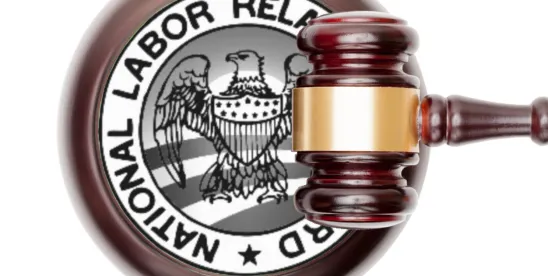On June 13, 2024, in Starbucks Corp. v. McKinney, 602 U.S. ___ (2024), the U.S. Supreme Court resolved a split amongst the circuits by holding that the National Labor Relations Board (“NLRB”) must meet the “traditional four-factor test” before obtaining a preliminary injunction against an employer.
In Starbucks, six employees at a Tennessee location, along with members of a union-organizing committee, invited a news crew to visit the store after hours to promote their unionizing efforts. Starbucks fired multiple employees involved with the media event, including members of the organizing committee in attendance, for violating company policy. The union coordinating with the employees filed charges with the NLRB, alleging that Starbucks unlawfully interfered with the employees’ right to unionize and discriminated against union supporters.
The NLRB issued a complaint against Starbucks and filed a petition under Section 10(j) of the National Labor Relations Act (“NLRA”) in federal court. The NLRB sought a preliminary injunction that would require Starbucks to reinstate the fired employees. The federal district court granted the injunction, and the Court of Appeals for the Sixth Circuit affirmed, holding that the NLRB met the Sixth Circuit’s two-part test under Section 10(j). The two-part test established by the Sixth Circuit merely required the NLRB to show that there was “reasonable cause to believe that unfair labor practices occurred” (i.e., that the NLRB’s legal theory was not frivolous), and that the relief was just and proper if it were necessary to return the parties to the status quo pending the NLRB’s internal proceedings, which protects the NLRB’s remedial powers under the NLRA. Similar two-part tests were followed in the Third and Fifth Circuits.
In Starbucks, the Supreme Court, in an opinion by Justice Thomas, resolved the split amongst the circuits and rejected the Sixth Circuit’s two-part test. The Court held that the traditional four-factor test, as articulated in Winter v. National Resources Defense Council, Inc., 555 U.S. 7 (2008), is applicable when the NLRB seeks a preliminary injunction under Section 10(j) in federal district court. Accordingly, to obtain a preliminary injunction, the NLRB must make a “clear showing” that (1) it is likely to succeed on the merits, (2) that it is likely to suffer irreparable harm in the absence of preliminary relief, (3) that the balance of equities tips in its favor, and (4) that an injunction is in the public interest. The Court noted that absent a clear command from Congress when interpreting statutes that authorize injunctive relief, courts must adhere to the traditional four-factor test, including for Section 10(j) of the NLRA.
The Supreme Court’s holding in Starbucks not only brings greater clarity in relation Section 10(j) (by resolving the circuit-split), it provides a greater level of protection to employers whose policies are attacked by the NLRB when it seeks preliminary injunctive relief. As the Court stated, “it is hard to imagine how the [NLRB] could lose under the [Sixth Circuit’s] reasonable-cause test if courts deferentially ask only whether the [NLRB] offered a minimally plausible legal theory, while ignoring conflicts laws or facts.” The Court has now made clear that for the NLRB to obtain preliminary injunctive relief under Section 10(j), it must meet the four-factor test traditionally applied to a variety of statutes providing for preliminary injunctions.




 />i
/>i

